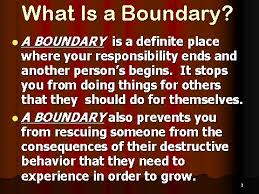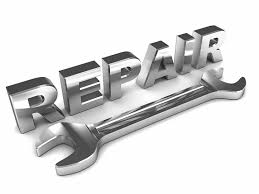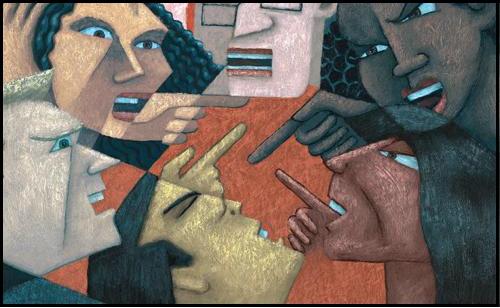Overview
 There is one area of personal development that can make or break your self-esteem and your ability to have healthy relationships: it’s the ability to set and implement healthy personal boundaries. Personal boundaries are the imaginary lines we draw around ourselves to maintain balance and protect our bodies, minds, emotions, and time from the behaviour or demands of others.
There is one area of personal development that can make or break your self-esteem and your ability to have healthy relationships: it’s the ability to set and implement healthy personal boundaries. Personal boundaries are the imaginary lines we draw around ourselves to maintain balance and protect our bodies, minds, emotions, and time from the behaviour or demands of others.
I was talking to someone about this recently after attending a Conference and then a dinner afterwards, when my internal voice had said “head for home; you need to preserve energy for tomorrow”. I likened it to a weighing scale, where we balance our own needs against the needs of others. and try and hold an awareness of both.
Some people suggest that it is a foundation of good self esteem that allow us to set appropriate boundaries They provide the framework to keep us from being used or manipulated by others, and they can allow us to confidently express who we are and what we want in life. Without healthy boundaries or with very weak boundaries, we struggle to have healthy relationships. You give up a part of yourself to be available or accommodating. Or you become so entangled with another person and their needs that you lose your own identity. This undermines your integrity and leads to a loss of self-respect — and probably the respect of those around you.
What makes it at times difficult to draw boundaries? Balancing our own needs with the needs of others certainly; maybe also fear?. The fear we won’t be loved, that we aren’t good enough or deserving enough just as we are, that if we give into that extra hour (when we really wanted to go home) we will have let someone down?
Types of boundaries
 Boundaries reflect more than our need for physical space. They include any aspect of our interactions with others, including our relationship with ourselves (for example avoiding self-sabotaging activities) and our environment (protecting ourselves from noise; as I get older and am out having meals at a busy restaurant, I sometimes struggle to hear all of what people are saying!).
Boundaries reflect more than our need for physical space. They include any aspect of our interactions with others, including our relationship with ourselves (for example avoiding self-sabotaging activities) and our environment (protecting ourselves from noise; as I get older and am out having meals at a busy restaurant, I sometimes struggle to hear all of what people are saying!).
Boundaries reflect our core values, our respect for ourselves and our need for safety and protection. They include being able to say no and mean it, or saying yes and meaning it. They are a way we define ourselves separately from another.
They include material boundaries (whether you give or lend things like books, money, clothes), emotional boundaries (separating your own emotions and responsibility for them from someone else’s), physical boundaries (your personal space, privacy; do you handshake or hug?!) amongst others.
Some of the challenges
I don’t know anyone in my circle of family, friends and work colleagues that doesn’t struggle with them sometimes trying too hard to “do the right thing”.
We probably all recognise some of these challenges:
· Saying no when you mean yes or yes when you mean no
· Feeling guilty when you do say no
· Acting against your integrity or values in order to please
· Not speaking up when you have something to say
· Not calling out someone who mistreats you
· Allowing yourself to be interrupted or distracted to accommodate another person’s immediate wants or needs.
· Becoming overly involved in someone’s problems or difficulties
· Not defining and communicating your emotional needs in your closest relationships
When you hit these challenges over personal boundaries, its powerful to observe that these act of compliance, self-denial, or neediness chips away at your own self-respect, let alone the respect that others have for you.
Personal Reflections
In a professional context, I feel I am fairly comfortable about setting boundaries. I have been in business as a free lancer for over 15 years, and have got accustomed to intuiting the situations on where to apply boundaries and when to be flexible about them. These days it’s the small things that I struggle with; sending out a set of dates to a client for a meeting or coaching session, and you spend 3 or 4 times chasing them to get it booked; you meet someone for a potential new piece of work and follow up afterwards, only for a  read receipt and no response, sometimes for weeks; having to continually chase invoices is a small bug bear periodically. I do often go above and beyond the stated objectives of a piece of work, but accept it’s my responsibility if I do this, and in most pieces of work I do it feels important to get right, as the work is important.
read receipt and no response, sometimes for weeks; having to continually chase invoices is a small bug bear periodically. I do often go above and beyond the stated objectives of a piece of work, but accept it’s my responsibility if I do this, and in most pieces of work I do it feels important to get right, as the work is important.
The one time the boundaries creaked and broke in work in the last couple of years was when Sally and I took on a joint project for a national organisation; I knew really from the first contracting meeting that it was going to be difficult and felt that the scope was probably too wide, that they wanted too much from the work. Over the next couple of weeks it kept getting wider and things changed every other day, and we realised that whatever we did wasn’t going to be right; a lesson in learning to listen to early intuition. It remains the only project in the last 10 years that we haven’t finished as amidst a lot of soul searching we pulled out in the first month.
On a personal and family basis, setting boundaries comes up with relationships and how you work things out as a family; from as parochial a decision as who gets to watch what they want on TV of an evening, to decisions about pocket money and holidays; it feels like we get more of these right than wrong, and usually things go awry only when we haven’t been able to hear what each person wants from that night out, a family meal, a holiday or whatever; it’s when they haven’t given voice to the boundaries and you find out half way through they didn’t want to do that thing that its hard.
I didn’t come from a family history of clear boundaries, which is probably the reason they have become so important to me. I used to do a lot of people pleasing, and ended up at lots of meetings and events that if I had had the courage, I wouldn’t have gone to. I hope with age and experience, I (a) know my own mind more and (b) am also able to state what I’m prepared to do and the limits of this
Setting boundaries
 A few thoughts on setting boundaries:
A few thoughts on setting boundaries:
- Statement of the obvious, but important to recognise that having personal boundaries is OK. It doesn’t mean you are selfish or unloving. It is both completely acceptable and absolutely necessary for healthy relationships to trust your instincts and feelings about what you do and don’t want in your life. No one knows better than you who you are and what you desire
- It’s worth sitting down and think about your boundaries and if and how you might be accepting situations that are really unacceptable to you. Make a list of things that people may no longer do to you, say to you, or do around you. Decide how you need physical and emotional space
- Work on the courage to talk to the people involved in crossing your personal boundaries and kindly remind them where they are. Let them know you have spent some time thinking about what is important and acceptable to you and what isn’t. There may be some defensiveness and push-back from those involved: however, they’ll get used to your new boundaries over time. It may be that some people in your life may fall away as a result of your outlook and demand for respect
- It may take some time to train yourself and others around your limits. Continue to reinforce them so that you are taken seriously and respected. Practice saying no when you are asked to do something you don’t want to do
- Remember that respecting boundaries goes two ways. Examine your own behaviour and words to see where you might be crossing another person’s boundaries. Work to change those behaviours so that you are reflecting the respect and support you want for yourself
- There’s a difference between healthy boundaries and rigid boundaries. The goal is a healthy relationship with those close to you, balanced by a sense of understanding, mutual support, and give-and-take. There may be occasions when you choose to bend your boundaries or allow someone to cross the line: when someone is hurt or sad, needs extra support, asks for an exception with respect and kindness
All in all, creating and holding onto personal boundaries is a lifelong developmental and complex thing to do, and often easier said than done. A dollop of self awareness, listening to intuition, and learning to state our needs as well as balance the needs of others means that we can all get what we want more often than not.






